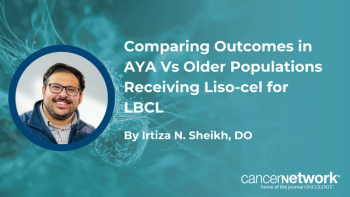
New Molecule Could Treat TKI-Resistant CML
STAT3 inhibition using a novel compound restored sensitivity to TKIs in CML cells that had shown resistance independent of BCR-ABL1 kinase activity.
STAT3 inhibition using a novel compound restored sensitivity to tyrosine kinase inhibitors (TKIs) in chronic myeloid leukemia (CML) cells that had shown resistance independent of BCR-ABL1 kinase activity, according to a new study
Though TKIs have revolutionized the treatment of CML, between 20% and 30% of patients fail on imatinib due to primary or acquired resistance. “BCR-ABL1 point mutations fail to explain many cases of clinical TKI failure, as many patients with resistance express exclusively native BCR-ABL1,” wrote study authors led by Michael W. Deininger, MD, PhD, of Huntsman Cancer Institute at the University of Utah in Salt Lake City. In such patients where resistance is independent of BCR-ABL1, the researchers hypothesized that targeting the signal transducer and activator of transcription 3 (STAT3) pathway may eliminate that resistance.
The group used structure-activity relationship (SAR) studies and compound library screens to identify BP-5-087, “a potent and selective STAT3 inhibitor.” They confirmed that this molecule binds to the STAT3 SH2 domain using both computation simulations and hydrogen-deuterium exchange assays.
They then tested the effects of BP-5-087 on primary CML cells from newly diagnosed patients. In treatment-naive cells, it had little effect, but in combination with imatinib it reduced formation of cells by 56%. It also showed good activity along with imatinib in CML cells with intrinsic TKI resistance (meaning, independent of BCR-ABL1). The effect was seen in both CML progenitor cells and in leukemic stem cells.
“Here, we demonstrate that STAT3 activation is a key feature of primary CML stem and progenitor cells with kinase-independent resistance,” the authors wrote. “STAT3 inhibition in combination with BCR-ABL1 reduces survival of TKI-resistant CML stem and progenitor cells, highlighting a critical role for STAT3.” They also noted that STAT3 activation has been implicated in malignant transformation as well as drug resistance in a number of other cancers. Because a number of different mechanisms have been shown to activate STAT3, targeting STAT3 directly rather than those upstream pathways could be a useful approach across other diseases as well.
“Our data unveil a novel mechanism of kinase-independent TKI resistance in primary CML stem and progenitor cells, and suggest that the STAT3 inhibitor, BP-5-087… may have utility for the treatment of TKI-resistant CML and other diseases characterized by STAT3 activation,” they concluded.
Newsletter
Stay up to date on recent advances in the multidisciplinary approach to cancer.














































